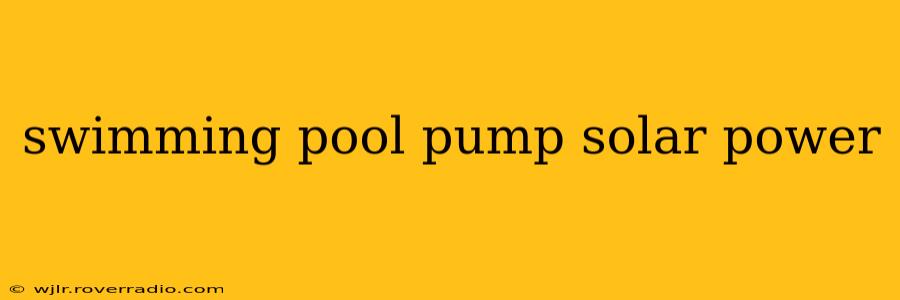Heating your pool with the sun is a popular choice, but did you know you can also power your pool pump using solar energy? This guide will explore the benefits, considerations, and practical aspects of using solar power for your swimming pool pump, helping you decide if it's the right choice for your home.
What are the Benefits of a Solar-Powered Pool Pump?
Switching to a solar-powered pool pump offers several compelling advantages:
-
Reduced Energy Costs: This is the most significant benefit. By harnessing free solar energy, you drastically reduce or even eliminate your electricity bill associated with pool pump operation. The savings can be substantial, especially in sunny climates.
-
Environmental Friendliness: Solar power is a clean, renewable energy source. By using solar energy, you minimize your carbon footprint and contribute to a more sustainable lifestyle.
-
Lower Maintenance: Solar panels require minimal maintenance compared to traditional power sources. Regular cleaning is usually all that's needed to ensure optimal performance.
-
Increased Property Value: Installing a solar-powered pool pump can enhance your home's value and appeal to environmentally conscious buyers.
How Does a Solar-Powered Pool Pump System Work?
A solar pool pump system typically involves:
-
Solar Panels: These convert sunlight into direct current (DC) electricity. The size and number of panels depend on the pump's power requirements and your local sunlight conditions.
-
Charge Controller: This regulates the flow of electricity from the solar panels to the batteries, preventing overcharging and damage.
-
Batteries (Optional): Batteries store excess solar energy for use during cloudy days or at night. While not strictly necessary for all systems, they provide continuous operation regardless of sunlight availability.
-
Inverter (Optional): If your pool pump requires alternating current (AC) power, an inverter converts the DC electricity from the panels or batteries into AC power. Many modern pool pumps are DC-powered, eliminating the need for an inverter.
-
Pool Pump: This is the heart of the system, circulating water in your pool. You may need a specific pump compatible with your solar power setup, especially if it is DC powered.
What Size Solar Panel System Do I Need?
Determining the appropriate size of your solar panel system depends on several factors:
-
Pool Pump Horsepower (HP): Higher HP pumps require more energy and therefore larger solar panels.
-
Daily Run Time: The longer your pump runs, the more energy you'll need.
-
Sunlight Availability: Areas with more sunshine will require fewer panels than those with less.
-
Peak Sun Hours: This is the number of hours per day that your location receives direct sunlight with sufficient intensity to power your system optimally.
It's best to consult with a solar energy professional to determine the ideal system size for your specific needs. They can assess your energy consumption and recommend the right number and type of solar panels.
What is the cost of installing a solar-powered pool pump?
The cost varies significantly depending on the size of the system, the type of panels used, labor costs, and any necessary permits. While upfront costs can be higher than traditional power, the long-term savings from reduced electricity bills make it a worthwhile investment for many homeowners.
How long does it take to install a solar-powered pool pump?
Installation time varies depending on system complexity and site conditions. A simple system might be installed in a day, while more complex setups could take several days.
Can I use my existing pool pump with solar power?
This depends on your pump's specifications. Some pumps are designed for DC power and are directly compatible with solar panels. Others require an inverter to convert the DC electricity from the panels to AC power. Check your pump's manual or consult a professional to determine compatibility.
Are solar pool pumps reliable?
Modern solar pool pumps and associated equipment are generally reliable, but like any system, they require proper installation and maintenance. Choosing reputable brands and working with experienced installers will significantly improve reliability.
Are there any government incentives for solar pool pumps?
Many governments offer incentives like tax credits or rebates to encourage the adoption of renewable energy technologies, including solar power for pools. Check with your local or national energy agency to see what incentives are available in your area.
By carefully considering the factors above and consulting with qualified professionals, you can make an informed decision about whether a solar-powered pool pump is the right investment for your home and lifestyle. The long-term benefits of reduced costs, environmental responsibility, and increased property value often outweigh the initial investment.
